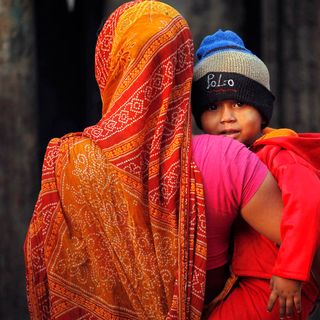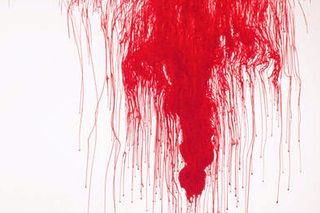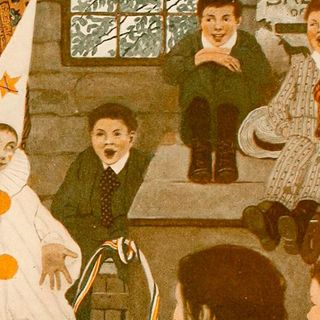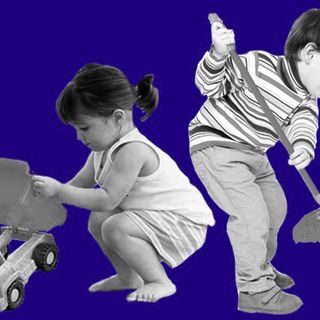
Bloody Brilliant Girls Are Latest to Be Period Shamed
Reducing women to body parts is the greatest shame.

I was fifteen when I was period shamed for the first time. I’d just moved back to India from the Gulf, and I was living with my orthodox grandparents. It was the time of a major festival, and Aunt Flo, my Bloody Buddy, waved a Red Flag. (Yes, these are just a few of the euphemisms for periods. We can’t even say “period,” period.) Back in my relatively privileged life in this Gulf, getting my period meant a few days of discomfort in the soaring temperatures and the sympathy of my friends.
In India, as soon as I told my grandmother, she ordered me to get up from the bed I was lying on. I was made to stand in the middle of the room, as she stripped the bed of its sheets. I was banished upstairs for three days while the festival took place on the ground floor. Food was delivered to me on a plate — I learned to listen for the clang because no one would hand me a plate. I was cut off, allowed to leave the house only by the back door so I didn’t ‘pollute’ the holy floor where the idol was kept.
This week, I realized that I’d had it easy.
Recently, over 40 young women in a college hostel in Madhya Pradesh were gathered together, made to strip and searched to ascertain who amongst them was menstruating. Why? Because their warden came across a used sanitary pad that hadn’t been disposed of properly, and wanted to identify the student who’d performed this heinous act.
This story is nothing new. In early 2017, a similar strip search occurred at a school in Uttar Pradesh when blood was found in the bathroom. In late 2017, a 12-year-old girl killed herself because her teacher shamed her in a class full of students, making her lift her salwar top up to display the stain to everyone. What did these wardens hope to achieve? Punishment for unhygienic living? We’d have to arrest just about every man in India, then, scratching themselves to glory.
The goal was simple: humiliation. How dare you women bleed, and then leave the evidence of it for everyone to see? Why aren’t you ashamed of bleeding, of your body, of yourselves? If you aren’t, then we will teach you to be.
And it’s an insidious lesson indeed. Right from birth, women are considered less than men – evidenced by the high numbers of female feticides and low levels of female literacy. And this mindset, which is already firmly entrenched in Indian society, is further enforced when society defines, punishes, or exalts women based solely on their reproductive systems.
Women are taught that they are ‘pure’ before puberty, while pregnant, or after menopause – periods of time when they aren’t menstruating. Entire neighbourhoods converge on married women to demand status reports of the latters’ wombs, but they also outcast menstruating women. Even though periods themselves are essential for two things India holds in complete reverence: pregnancy and motherhood. As if dealing with blood every month wasn’t disconcerting enough, society inflicts immense damage on female psyches by making women feel that they are somehow soiled, ‘unclean’ and unworthy.
When a woman’s self-worth is reduced to her body parts, as well as intangible categories like unclean and clean, it can have a tangible effect on the rest of her life, making her feel unable to protect herself from dangers like emotional abuse and domestic violence. Her lack of self-worth also may make her feel she deserves the violence, normalizing the abuse in the eyes of her abuser. Those who believe that a girl is no longer pure after puberty likely also believe that a woman is responsible for the DNA of her child – that is, the many people in India who blame mothers for giving birth to daughters instead of sons. 23% of Indian girls drop out of school when they start to menstruate – and later on, women who brave the odds and pursue higher education are relentlessly harassed.
My brush with period shaming happened in 1997. But many families still practice period untouchability. A survey conducted by TISS Mumbai found that eight of ten Indian girls were not allowed to enter religious shrines when on their period. Six out of ten girls were not allowed to touch food in the kitchen and three out of ten had to sleep in a separate room.
A lot of my great aunts, who rolled their eyes at my weeping then, tried to explain to me that this whole thing had a scientific basis. Since there were no pads, and women used cloth, making them sit separately was necessary to contain infections. Women were not allowed to cook so that they didn’t tire themselves out on their period. Oh, right. The Patriarchy was trying to protect us. Of course. Then why did menstruating women have to wash their own clothes and cook their own food? By this logic, shouldn’t a non-menstruating person have been feeding menstruating women grapes after washing their own hands to avoid infection? The truth is simple – period shaming has no scientific basis.
This constant judgment based on women’s biology has to stop. It perpetuates the idea that women are only as good as their biological functions – which are completely outside their control.
Men are not judged by the same standards. For the sake of argument, let’s assume a used tissue covered in snot was found in a men’s hostel. Would the offending item be quietly disposed of, or would the men be strip searched?
Oh, it’s not the same thing, the patriarchy cries. Oh yes it is, I counter. It’s bodily fluids in a disposable receptacle. The only reason you’re reacting like this is because period shaming has been going on for so long, we don’t even know we’re doing it. If we were to accept periods for what they really are – a normal bodily function – we’d be desensitized to period blood in the same way we are snot-filled tissues. Instead of focusing on bleeding, we need to focus on helping India’s young women to get bleedin’ brilliant.
Akhila Vijaykumar is a writer with experience across advertising and journalism. Occasionally, the crossover does make her demand truth from soap and try to cajole quotes into starbursts, but no harm no foul. She loves books by Terry Pratchett, dogs and pizza, often at the same time.
Related


Labeling Kids ‘Class Clowns’ Creates a Self‑Fulfilling Prophesy
